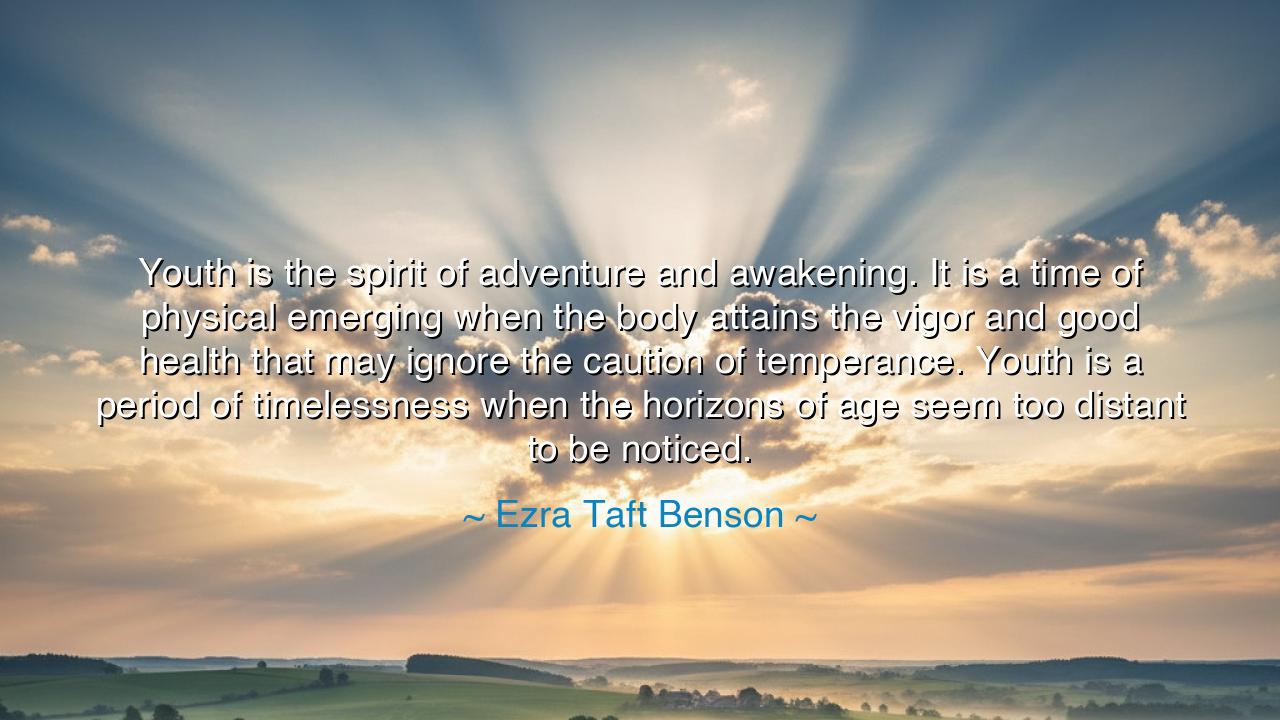
Youth is the spirit of adventure and awakening. It is a time of
Youth is the spirit of adventure and awakening. It is a time of physical emerging when the body attains the vigor and good health that may ignore the caution of temperance. Youth is a period of timelessness when the horizons of age seem too distant to be noticed.






“Youth is the spirit of adventure and awakening. It is a time of physical emerging when the body attains the vigor and good health that may ignore the caution of temperance. Youth is a period of timelessness when the horizons of age seem too distant to be noticed.” Thus spoke Ezra Taft Benson, a man of faith and vision, whose words capture the blazing fire that burns within the heart of youth. In this saying, he unveils both the beauty and the peril of youth—that fleeting season of boundless energy, daring exploration, and radiant hope. His words remind us that youth is not merely an age of years, but a state of soul—a sacred moment in life when the world seems infinite, when the body feels immortal, and when the heart beats to the rhythm of dreams unbounded by fear.
From the dawn of civilization, the ancients saw youth as a divine gift—a time when the soul, newly awakened to its power, reaches outward to test the limits of destiny. In every myth, the young hero is the one who sets forth upon the great journey: Achilles, aflame with glory; Alexander, with the world spread before him like a map to be conquered; David, the shepherd boy who faced a giant with nothing but faith and a sling. Youth, in its essence, is the spirit of adventure—that restless urge to climb higher, to seek truth, to make one’s mark upon the world. It is a time when the flame of possibility burns brighter than the shadow of consequence, when the future feels eternal and the present, divine.
Yet, Benson’s words do not merely praise youth; they temper it with wisdom. He speaks of the “caution of temperance” that youth may ignore, for strength and vitality can easily become arrogance. The ancients knew this well. Icarus, in his youthful pride, flew too close to the sun and fell. Alexander, though a conqueror, died at thirty-two, his empire vast but his life unfulfilled. Such tales endure as warnings, not to dim the flame of youth, but to guide it—reminding us that power without restraint, passion without purpose, and vigor without virtue lead not to greatness, but to ruin.
Still, there is holiness in the “period of timelessness” Benson describes. For youth is not yet burdened by the weight of regret or the fear of endings. It is the dawn of life, where the horizons of age seem far beyond sight, and each day is lived as if eternity were near. The wise do not scorn this blindness, for it is through such fearless joy that discovery is born. Every invention, every revolution, every movement that reshaped the world began with someone who was young enough to believe that the impossible could be done. The fire of youth has built cities, carved mountains, and even reached the stars.
Yet the true challenge of youth is not in its energy, but in its awakening—for as the spirit stirs to its own greatness, so too must it learn humility. To awaken fully is to understand that life’s vigor is not given merely for pleasure, but for purpose. The youth who learns to harness their passion for service, for truth, for creation, becomes not merely strong but wise. The energy that once sought adventure outward begins to turn inward, shaping the soul into something enduring and whole. For youth is the season not just of doing, but of becoming.
Consider the story of Joan of Arc, a young girl of seventeen who, in a time of despair, rose to lead armies and awaken a nation’s faith. Her courage was not reckless, but guided by vision. Her youth was her strength, not her weakness, for she dared to act while others hesitated. Though her life was short, her spirit was eternal—proof that the flame of youth, when lit by purpose, can illuminate centuries. So too, each generation must find its calling, its moment of awakening, when youthful fire is transformed into the steady light of wisdom.
The lesson, then, is this: cherish your youth, but do not waste it. Let its energy not be scattered in vanity, but focused upon something noble. Seek adventure, but let it refine you rather than consume you. Remember that time is fleeting, though in youth it feels infinite. Use your strength while you have it to build, to learn, to love, and to serve. The vigor of youth is a divine loan, not a permanent possession—its true purpose is to forge the spirit that will endure when strength fades.
So remember the words of Ezra Taft Benson, and hold them close: “Youth is the spirit of adventure and awakening.” Live your youth not as a careless blaze that burns out too soon, but as a sacred fire that lights the path for your future self. Let your courage lead, let your curiosity guide, and let your wisdom grow. For when youth is lived with both daring and temperance, it becomes not a fleeting moment of life, but the foundation of all that is eternal in the human soul.






AAdministratorAdministrator
Welcome, honored guests. Please leave a comment, we will respond soon